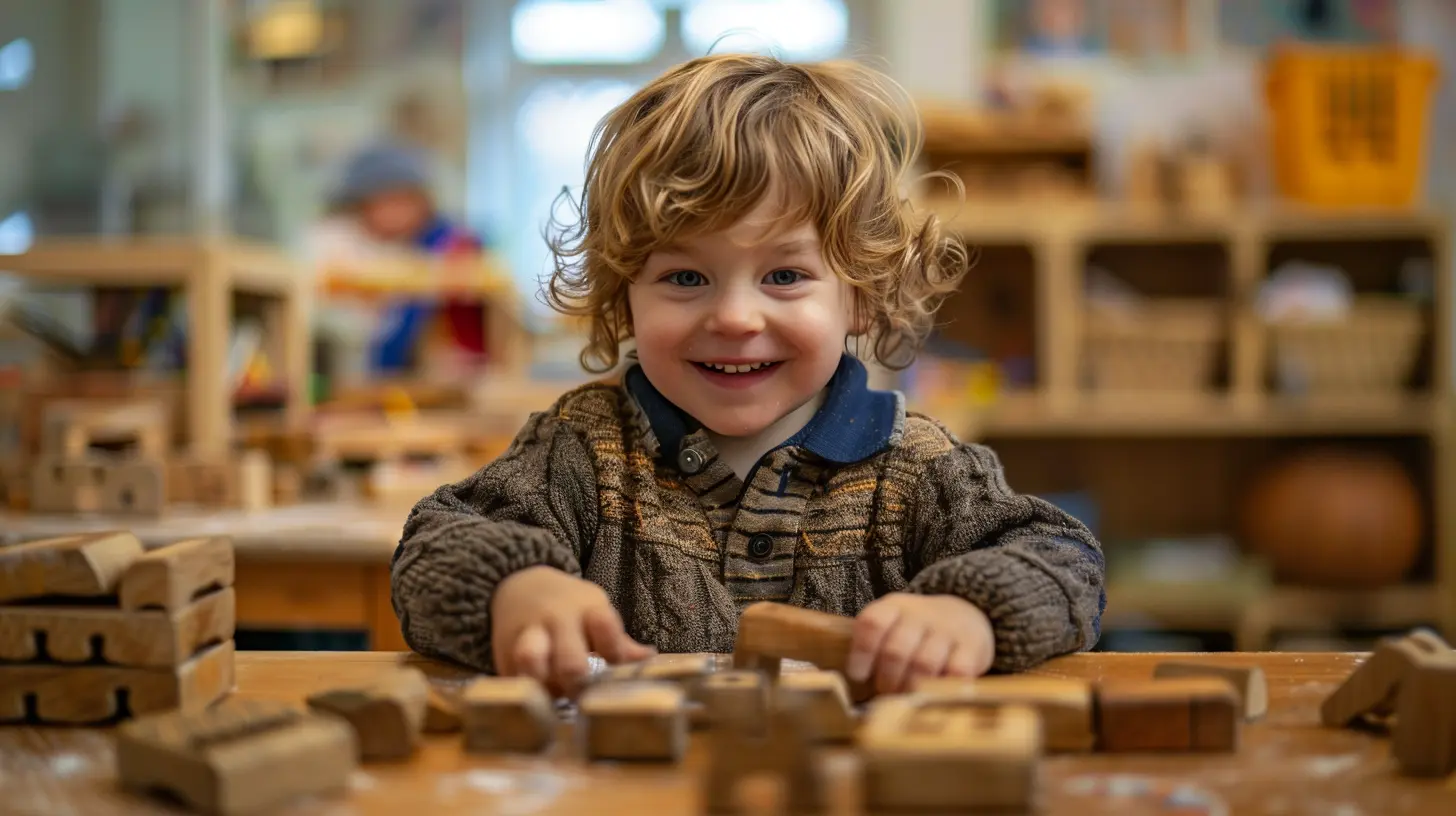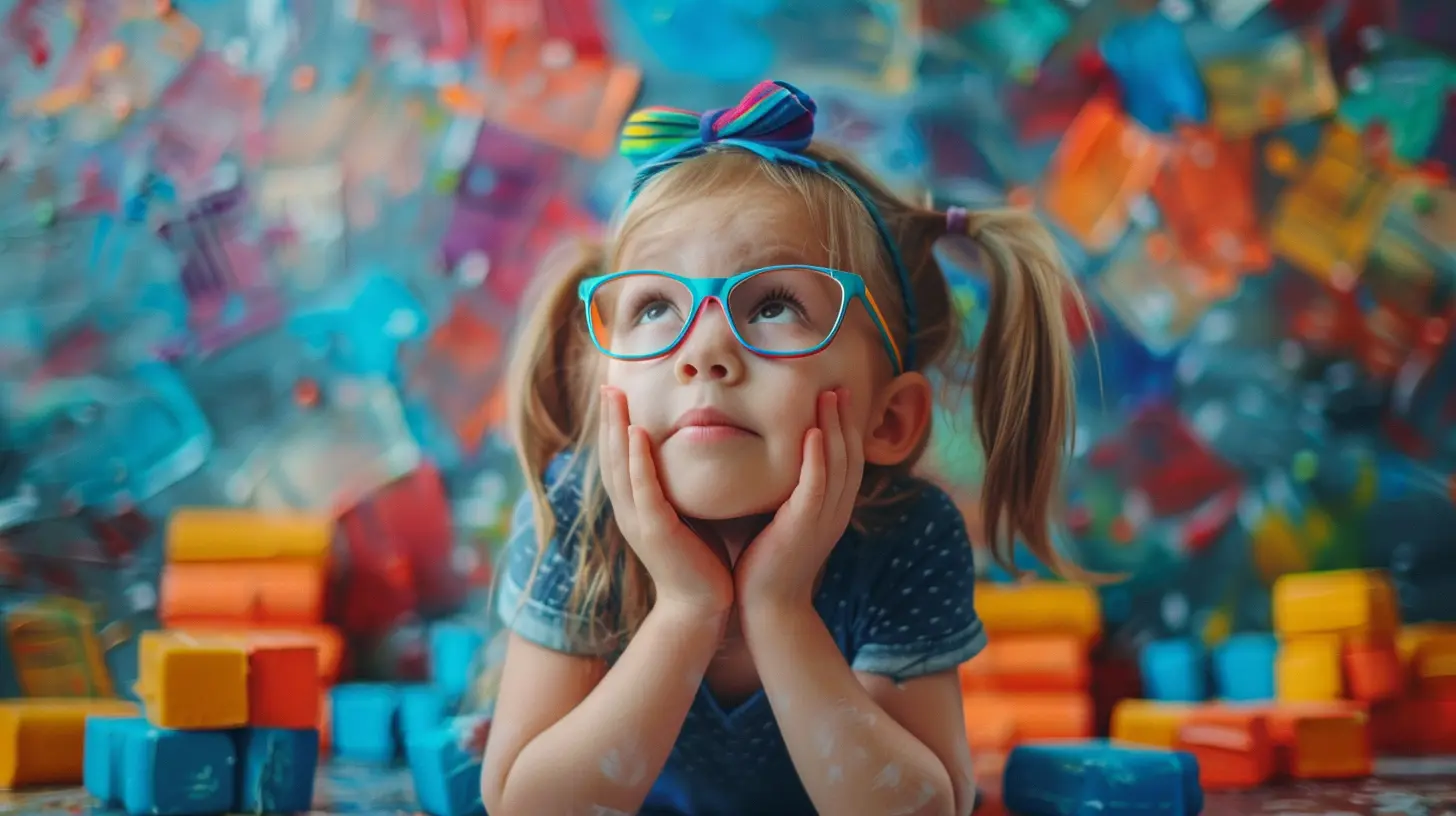Supporting Cognitive Development Through Play
23 July 2025
If you’re like most parents, the word “play” probably brings to mind spilled blocks, shrieks of laughter, and tiny tornadoes of chaos. Yep, play can be messy—but it's also magical. Why? Because play isn't just about fun; it's a powerhouse for boosting your child’s brainpower. Supporting cognitive development through play is like giving your little one a gym membership—for their mind!
So, grab a cup of coffee (or reheat the one you forgot about an hour ago) and let’s chat about how playtime is shaping your future genius.
What Is Cognitive Development, Anyway?
Before we dive into the fun stuff, let’s break down this fancy term—cognitive development. Basically, it’s how kids think, learn, problem-solve, and remember. It’s all the mental stuff, from recognizing numbers to understanding feelings.And guess what? Your child’s brain is like a sponge. Between the ages of 0 and 5, cognitive growth happens faster than a toddler running toward an open snack drawer.
Why Playtime Packs a Cognitive Punch
Here’s the cool part: play is how kids make sense of the world. It’s not just downtime—it’s prime brain-building time!Imagine their brain as a construction site. During play, they’re laying down roads (neural pathways), putting up bridges (connections), and installing signs (problem-solving skills). When kids play, they’re not just moving toys—they’re moving mountains in their minds.
Types of Play That Build Brilliant Brains
Play comes in many flavors. Each one feeds your child’s growing brain in its own unique way. Let’s take a peek at the all-stars of cognitive development.1. Pretend Play (a.k.a. Imaginative or Dramatic Play)
Ever walked in on your kid hosting a tea party for dinosaurs? Or seen them turn a cardboard box into a spaceship? That’s pretend play—and it’s pure gold for cognitive growth.Why it works:
- Boosts language development
- Encourages abstract thinking
- Builds social and emotional intelligence
- Fosters problem-solving
When your child pretends to be a doctor or a superhero, they’re practicing real-life roles, learning cause and effect, and even managing emotions. It’s like a brain workout wearing a cape.
2. Constructive Play
Think building blocks, puzzles, Magna-Tiles, Legos, and forts made from couch cushions. This type of play invites kids to manipulate their environment, and boy, do their brains love it.What it teaches:
- Spatial awareness
- Fine motor skills
- Logical thinking
- Planning and sequencing
When they figure out how to keep a block tower from toppling over, that's physics, engineering, and resilience—all before lunch.
3. Physical Play
Tag, hopscotch, dancing, climbing, or even just rolling around on the floor—these energetic moments are amazing for young bodies and brains.Cognitive perks include:
- Enhancing memory and focus
- Developing motor planning
- Strengthening decision-making skills
Think of it as cardio for cognition. Movement helps with oxygen flow to the brain, which can actually boost learning. Plus, it burns off energy (and you might get a break. Win-win!).
4. Sensory Play
Slime, sand, water tables, and finger painting—yes, the messy stuff. Sensory play is a feast for young minds.Why it matters:
- Encourages exploration and experimentation
- Strengthens descriptive language
- Sparks curiosity and creativity
- Helps with memory and attention
And while it might mean more laundry for you, sensory play encourages your kid to investigate textures, sounds, and smells—firing up all those cognitive connections.
5. Games with Rules
Think Candy Land, Go Fish, or “Simon Says.” Even something as simple as "Red Light, Green Light" teaches self-control and logic.Cognitive Gains:
- Improves memory and attention span
- Teaches sequencing and prediction
- Encourages flexible thinking
- Builds planning and strategy skills
Following rules, taking turns, thinking ahead—these are all prime executive function skills in disguise.
Everyday Play Ideas That Boost Brain Power
You don’t need a mini-preschool setup at home. Supporting cognitive development through play can happen anywhere—with things you already have.Try These Brain-Boosting Play Ideas:
- Scavenger hunts – Teach categorization and memory- DIY obstacle courses – Promote planning and spatial thinking
- Sorting games – Use buttons or snacks to teach patterns
- Story building – Start a story and let them finish it
- “What if?” games – Encourage abstract thinking and imagination
And the best part? These activities don’t require a degree in education or a trip to the toy store. Just your time and curiosity.
Your Role in Play: Be the Guide, Not the Boss
Here’s a little secret: You don’t need to “teach” during play. You just need to be there, be curious, and offer opportunities to explore.Ask open-ended questions like:
- “What do you think will happen if we stack one more block?”
- “Why did you choose this color?”
- “How would you solve that problem?”
These kinds of questions spark critical thinking without feeling like a test. Think of yourself as a co-adventurer, not a taskmaster.
How Screen Time Fits In (or Doesn’t)
Okay, let’s talk screens. Tablets and smartphones can have educational value, but nothing beats real-life, hands-on, play-based learning. Screens tend to be passive; imagination and creativity thrive in active play.If your child does engage with digital games, look for apps that:
- Encourage problem-solving
- Support creativity (drawing, building, storytelling)
- Involve some interaction (not just tapping a screen)
Tip: Balance is key. A good rule? For every 30 minutes of screen time, follow up with 30 minutes of active play. Keeps things even-steven!
Play and Brain Building by Age Group
Wondering what's best for your child’s age? Here’s a quick cheat sheet:Infants (0–12 months):
- Tummy time- Peek-a-boo
- Toys with different textures and sounds
Toddlers (1–3 years):
- Stacking toys- Pretend play (kitchens, puppets, doctor kits)
- Puzzles with large pieces
Preschoolers (3–5 years):
- Dress-up and make-believe- Obstacle courses
- Board games with simple rules
Early School-Aged (5–7 years):
- Strategy games- Science kits
- Building and crafting projects
Each age has its own kind of play, but the goal remains the same: keep it fun, keep it engaging, and let their brains feast on experience.
Common Myths Parents Believe About Play
Let’s bust a few myths for good measure.Myth #1: Play is a break from learning.
Nope! Play is actually the most productive way kids learn.
Myth #2: The fancier the toy, the better the brain boost.
Not true. A cardboard box can offer more imaginative play than a flashy $100 toy.
Myth #3: Kids need constant guidance to learn during play.
Actually, free play—where kids steer the ship—often leads to deeper learning.
Final Thoughts: Let Them Play, Their Brains Are at Work!
You don’t need to enroll your toddler in a neuroscience class or buy the latest “brain-boosting” gadget. Just let them play. Encourage pretend adventures, messy exploration, and goofy games. That’s the secret sauce.Cognitive development through play isn’t about perfection—it’s about participation. So next time you see your child building a block tower or having a deep conversation with a stuffed animal, smile. They’re learning, growing, and wiring their brain for a bright future.
So go on—step into the world of make-believe, get your hands a little messy, and support your child’s curious, brilliant mind through the power of play.
all images in this post were generated using AI tools
Category:
Child DevelopmentAuthor:

Austin Wilcox
Discussion
rate this article
1 comments
Raine Lozano
This article beautifully highlights the importance of play in fostering cognitive development in children. Engaging in playful activities not only enhances critical thinking skills but also strengthens emotional bonds, making learning a joyful experience for kids.
August 11, 2025 at 3:34 AM

Austin Wilcox
Thank you for your thoughtful comment! I'm glad you found the article informative and appreciate the emphasis on the vital role of play in children's cognitive and emotional growth.


